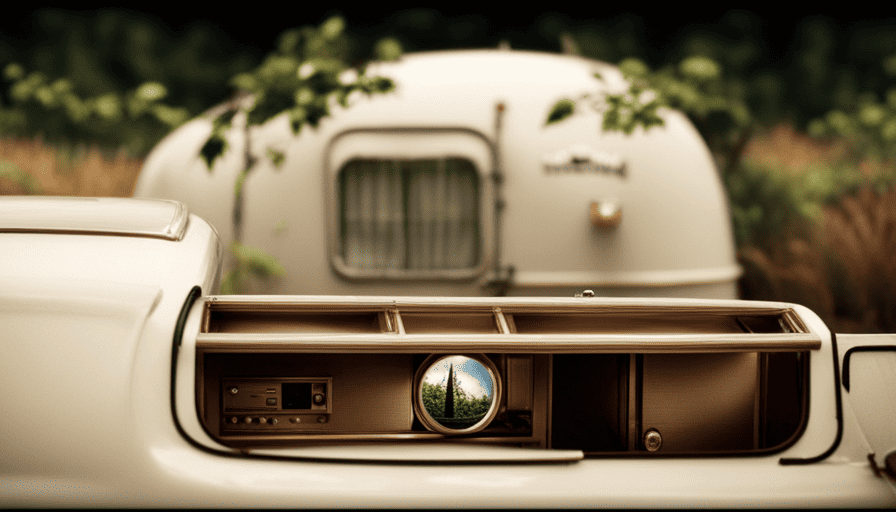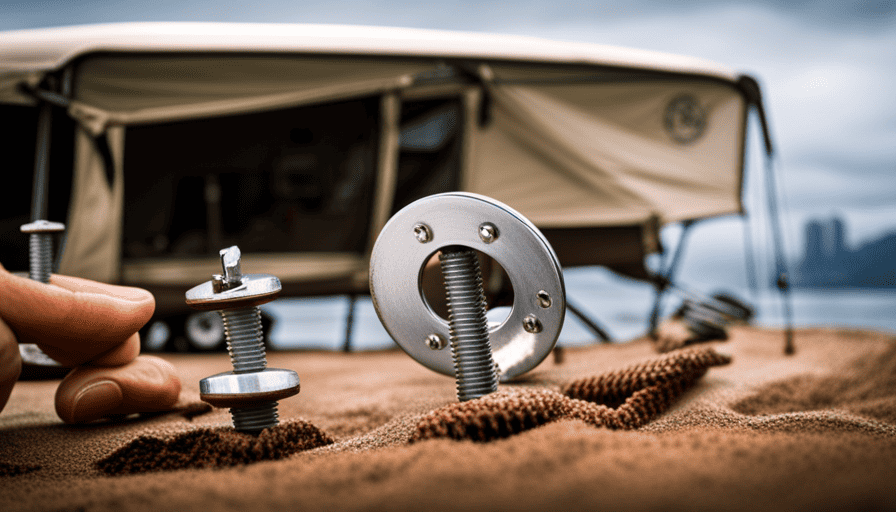Purely by luck, just as I was getting ready for my highly anticipated camping trip, I discovered some unwelcome guests making themselves at home in my camper: spiders. Determined to keep these creepy crawlies at bay, I set out on a mission to find the most effective strategies for keeping spiders out of my camper.
In this article, I will share with you the practical steps I took to ensure a spider-free camping experience. From sealing cracks and openings, to using spider repellent sprays and essential oils, to keeping my camper clean and clutter-free, I tried it all.
Additionally, I found that removing food sources, using traps, and employing natural deterrents like vinegar and peppermint oil proved to be invaluable in my quest. And let’s not forget the importance of keeping your camper well-lit at night, shaking out gear and clothing, and regularly inspecting and cleaning your camper to prevent infestations.
So, if you’re ready to enjoy a spider-free camping adventure, let’s dive into these tried-and-true techniques together.
Key Takeaways
- Seal cracks and openings in camper using silicone caulk or expanding foam
- Use spider repellent sprays or essential oils to create a barrier spiders will avoid
- Keep camper clean and clutter-free using storage containers and natural cleaners
- Install screens on windows and vents to prevent spiders from entering
Seal any cracks or openings in your camper
To keep those creepy crawlies out of your camper, make sure you seal up any cracks or openings! This is an essential step in preventing spiders from finding their way into your living space.
There are several sealant options available that can effectively close off these entry points. One popular choice is silicone caulk, which is waterproof and long-lasting. It can be used to seal gaps around windows, doors, and vents. Another option is expanding foam, which is great for filling larger gaps and holes. It expands to fill the space and provides a tight seal.
Before applying any sealant, it’s important to thoroughly inspect your camper for any cracks or openings. Check the exterior for any gaps in the siding or around windows and doors. Also, inspect the interior for any holes or gaps in the walls or flooring. Once you have identified these areas, clean them thoroughly to remove any dirt or debris, as it can prevent the sealant from adhering properly.
After sealing up your camper, you can further enhance spider prevention by using spider repellent sprays or essential oils. These products can be sprayed around the perimeter of your camper, windows, and doors to create a barrier that spiders will avoid. Some effective repellents include peppermint oil, vinegar, and citrus oils.
By taking these preventive measures and sealing up any cracks or openings, you can significantly reduce the chances of spiders entering your camper.
Use spider repellent sprays or essential oils
Spray or dab some spider repellent or essential oils to ward off those creepy crawlers in your camper, creating a barrier they’ll run from like scared mice. Spider repellents are a popular choice for keeping spiders away from your living space. These repellents typically contain chemicals like pyrethroids, which are known to repel spiders effectively. They can be easily found in stores or online, and come in various forms such as sprays, powders, or granules. Simply follow the instructions on the label to apply them in areas where spiders are likely to enter, such as doorways, windows, or cracks.
If you prefer a more natural approach, essential oils can also be used as spider deterrents. Oils like peppermint, tea tree, or citrus have strong scents that spiders dislike. Mix a few drops of your chosen oil with water in a spray bottle and apply it around your camper. Not only will it keep spiders away, but it will also leave a pleasant aroma. However, it’s important to note that the effectiveness of essential oils may vary, and they may need to be reapplied more frequently than chemical repellents.
In the table below, I have listed some commonly used spider repellents and their effectiveness:
| Repellent | Effectiveness |
|---|---|
| Pyrethroid spray | High |
| Peppermint oil | Moderate |
| Citrus oil | Low |
By using spider repellents or essential oils, you can significantly reduce the presence of spiders in your camper. However, it’s important to remember that these methods are not foolproof, and spiders may still find their way inside. To further prevent spider infestations, it’s crucial to keep your camper clean and clutter-free.
Keep your camper clean and clutter-free
Maintaining a tidy and organized living space inside your camper is essential for creating an unwelcome environment for unwanted eight-legged visitors. Here are some organizing tips for a clutter-free camper that’ll help keep spiders at bay.
First, make use of storage containers and bins to keep your belongings organized and off the floor. This not only creates more space but also eliminates potential hiding spots for spiders.
Additionally, regularly declutter your camper by getting rid of any unnecessary items that may attract spiders.
Next, try using DIY natural cleaners to keep your camper spider-free. Mix equal parts of vinegar and water to create a solution that can be used to wipe down surfaces. Spiders are repelled by the smell of vinegar, making it an effective natural deterrent. Another option is to mix a few drops of essential oils such as peppermint, lavender, or citrus with water in a spray bottle. Spritz this mixture around windows, doors, and other entry points to keep spiders away.
By following these organizing tips and using natural cleaners, you can create a clean and clutter-free living space that spiders’ll want to avoid.
In the next section, we’ll discuss how to remove any food sources that may attract spiders.
Remove any food sources that may attract spiders
Banish the buffet by eliminating any edible enticements that might beckon eight-legged intruders into your mobile abode. To keep spiders out of your camper, it’s important to remove any food sources that may attract them.
Here are some spider prevention methods to consider:
- Seal food tightly: Store all food in airtight containers to prevent spiders from sniffing out a meal.
- Clean up spills: Spiders are attracted to crumbs and spills, so be sure to promptly clean up any food or drink spills.
- Empty trash regularly: Dispose of garbage regularly to avoid attracting spiders looking for a feast.
- Avoid leaving pet food out: If you have pets in your camper, don’t leave their food out overnight as it can attract spiders.
- Use natural remedies: Spiders dislike certain scents, so consider using natural remedies like peppermint oil or vinegar to repel them.
By following these tips and removing any potential food sources, you can greatly reduce the chances of spiders making themselves at home in your camper. To further enhance your spider prevention efforts, let’s explore the next step: using spider traps or sticky traps.
Use spider traps or sticky traps
To catch those sneaky little arachnids, try setting up spider traps or sticky traps inside your mobile abode. Spider traps are an effective spider control method that can help prevent these eight-legged creatures from invading your camper. These traps work by luring spiders with bait, such as insects or pheromones, and trapping them in a sticky adhesive. They’re easy to set up and can be placed in areas where spiders are commonly found, such as corners, closets, or under furniture.
When using spider traps, it’s important to choose the right locations for optimal effectiveness. Place the traps near potential entry points, such as doors or windows, as well as in areas where spiders are likely to hide or travel. Check the traps regularly and replace them as needed. Spider traps are a non-toxic and safe method for spider prevention, making them suitable for use in a camper where chemicals may not be desirable.
By incorporating spider traps or sticky traps into your spider prevention techniques, you can significantly reduce the number of spiders inside your camper. However, it’s important to remember that traps alone may not completely eliminate spiders. In the next section, we’ll discuss another effective method to keep spiders out of your camper: installing screens on windows and vents.
Install screens on windows and vents
Installing mesh screens on windows and vents is a surefire way to create a barrier that prevents those creepy crawlers from making their way into your humble abode on wheels. These screens are designed to keep out insects, including spiders, while still allowing fresh air to flow through your camper.
To install mesh screens, start by measuring the dimensions of your windows and vents. Then, purchase screens that are the appropriate size and attach them securely using adhesive or screws. Make sure to cover all openings, including small gaps or cracks where spiders can squeeze through.
In addition to mesh screens, you can also consider using screen doors for your camper. These doors are specifically designed with a fine mesh that acts as an additional layer of protection against spiders and other insects. They allow you to enjoy the breeze without worrying about unwanted guests.
By installing screens on windows and vents, you can significantly reduce the chances of spiders finding their way inside your camper. However, if you want to further enhance your spider-proofing efforts, you can also use natural spider deterrents like vinegar or peppermint oil. These substances emit strong scents that spiders dislike, making them less likely to enter your living space.
With a combination of mesh screens and natural deterrents, you can create a spider-free environment for your camping adventures.
Use natural spider deterrents like vinegar or peppermint oil
Enhance your spider-proofing efforts by incorporating natural spider deterrents like vinegar or peppermint oil into your camping routine. These alternative spider repellents can be effective in keeping spiders away from your camper without the use of harsh chemicals.
Vinegar, for example, has a strong smell that spiders find unpleasant, making it an excellent natural deterrent. Simply mix equal parts water and vinegar in a spray bottle and apply it to areas where spiders are likely to enter, such as windowsills and doorways.
Peppermint oil, on the other hand, has a strong scent that spiders dislike. You can create a peppermint oil spray by mixing a few drops of the oil with water in a spray bottle and applying it to areas where spiders may be present. Additionally, you can soak cotton balls in peppermint oil and place them strategically around your camper to further deter spiders.
By using these natural spider deterrents, you can create a less inviting environment for spiders and decrease the likelihood of them entering your camper.
Now, let’s move on to the next step: keeping your camper well-lit at night.
Keep your camper well-lit at night
Make sure you illuminate your camper at night to create an unwelcome environment for eight-legged visitors. Outdoor lighting is essential for camping safety and can help keep spiders away. By keeping your camper well-lit, you not only deter spiders but also improve visibility around your campsite, reducing the risk of accidents.
Here is a table that provides some ideas for outdoor lighting options:
| Lighting Option | Benefits |
|---|---|
| Solar-powered lights | Environmentally friendly, cost-effective, easy to install |
| LED lanterns | Portable, long battery life, adjustable brightness |
| String lights | Decorative, create a cozy ambiance, easy to hang |
| Motion sensor lights | Energy-efficient, automatically turn on when movement is detected |
| Headlamps or flashlights | Hands-free, versatile, ideal for personal use |
Using any of these lighting options will not only keep spiders away but also enhance your overall camping experience. Additionally, a well-lit campsite can help you spot and avoid spiders or other unwanted critters.
To further prevent spiders from entering your camper, remember to shake out or inspect any camping gear or clothing before bringing it inside. This will help ensure that you are not inadvertently inviting spiders into your living space.
Shake out or inspect any camping gear or clothing before bringing it into your camper
Before you bring any camping gear or clothing into your camper, remember to shake them out or inspect them to prevent any unwanted guests from joining you. This simple step can help you avoid spider encounters and prevent spider bites during your camping trip. Here are some tips to help you with this process:
-
Shake out your camping gear: When packing up your gear after a camping trip, give it a good shake to dislodge any spiders or other insects that may have taken refuge in it. Pay extra attention to items such as sleeping bags, tents, and backpacks, as spiders can easily hide in these.
-
Inspect your clothing: Before bringing any clothes into your camper, carefully inspect them for any signs of spiders. Look for webs, egg sacs, or even the spiders themselves. Shake out your clothes vigorously to ensure that no spiders are hiding in them.
By taking the time to shake out or inspect your camping gear and clothing, you can greatly reduce the risk of spiders entering your camper and potentially biting you. However, this is just one step in preventing spider infestations. It’s also important to regularly inspect and clean your camper to ensure that no spiders have made a home in it.
Regularly inspect and clean your camper to prevent spider infestations
To effectively prevent spider infestations, it’s crucial to regularly inspect and clean your camper. By doing so, you can ensure that any potential spider hiding spots are identified and eliminated.
Start by thoroughly checking all corners, crevices, and storage areas for any signs of spider webs or egg sacs. Pay attention to areas such as the ceiling, walls, and floor, as spiders can easily crawl into these spaces. If you spot any webs or eggs, carefully remove them using a vacuum or a broom.
In addition to regular inspections, it’s important to keep your camper clean. Spiders are attracted to dirt, debris, and food crumbs, so make sure to thoroughly sweep and mop the floors, wipe down surfaces, and clean up any spills or messes. By keeping your camper tidy, you can greatly reduce the chances of a spider infestation.
To further prevent spider bites, you can also use natural spider repellents. Peppermint oil, vinegar, and citrus peels are all known to deter spiders. Simply place a few drops of peppermint oil or vinegar in a spray bottle with water and lightly mist the areas where spiders are likely to hide. You can also strategically place citrus peels near entry points to keep spiders away.
By regularly inspecting and cleaning your camper, as well as using natural spider repellents, you can effectively prevent spider infestations and reduce the risk of spider bites while enjoying your camping adventures.
Frequently Asked Questions
What are some natural spider deterrents that can be used in a camper?
Sure, I can help! When it comes to keeping spiders away from your camper, there are some effective natural spider repellents that you can easily make yourself.
Some DIY spider deterrents include using essential oils like peppermint, lavender, or tea tree oil, as spiders dislike these scents.
Another option is to sprinkle diatomaceous earth around your camper, as it can be an effective barrier against spiders.
These natural remedies can help keep your camper spider-free without the use of harmful chemicals.
How can I keep my camper well-lit at night to prevent spiders?
To keep my camper well-lit at night and prevent spiders, I use a combination of techniques.
First, I install exterior lights around the perimeter of the camper to deter spiders from approaching.
Inside, I use LED lights with bright, white bulbs to keep the space well-lit.
Additionally, I regularly clean and declutter the camper to eliminate potential hiding spots for spiders.
These spider prevention techniques help ensure a well-lit and spider-free camping experience.
Is it necessary to inspect and clean my camper regularly to prevent spider infestations?
Regular inspection and cleaning of my camper is absolutely necessary to prevent spider infestations. Like an eagle eye, I meticulously check every nook and cranny for any signs of spider activity.
By keeping my camper clean and free of clutter, I eliminate potential hiding spots for these eight-legged intruders.
Additionally, I employ various spider prevention methods such as sealing cracks and gaps, using spider repellents, and ensuring proper ventilation.
These proactive maintenance measures ensure a spider-free haven for my camping adventures.
What are some common food sources that may attract spiders in a camper?
Common food sources that may attract spiders in a camper include crumbs, leftover food, and improperly stored food. To prevent spider attraction, it’s important to properly store food in sealed containers or in airtight bags. Clean up any spills or crumbs immediately, and regularly check for any signs of food debris. Additionally, make sure to keep the camper clean and free from clutter to minimize hiding spots for spiders.
Can I use vinegar or peppermint oil to keep spiders out of my camper?
I’ve found that both vinegar and peppermint oil can be effective natural spider repellents. Vinegar works by disrupting spiders’ sensory systems, making them less likely to enter your camper. Peppermint oil, on the other hand, has a strong scent that spiders find repulsive.
However, it’s important to note that the effectiveness of these natural deterrents may vary depending on the specific spider species and infestation level. It’s always a good idea to use a combination of methods for better results.
Conclusion
So there you have it, folks! By following these simple tips, you can keep those pesky spiders out of your camper and enjoy your camping adventures.
Seal up any cracks, use spider repellents or essential oils, and keep things clean and clutter-free. Remove any food sources that may attract spiders. Don’t forget to use spider traps or natural deterrents like vinegar or peppermint oil.
Keep your camper well-lit at night and always inspect your gear before bringing it in. Regular maintenance is key to preventing spider infestations. Happy camping!










